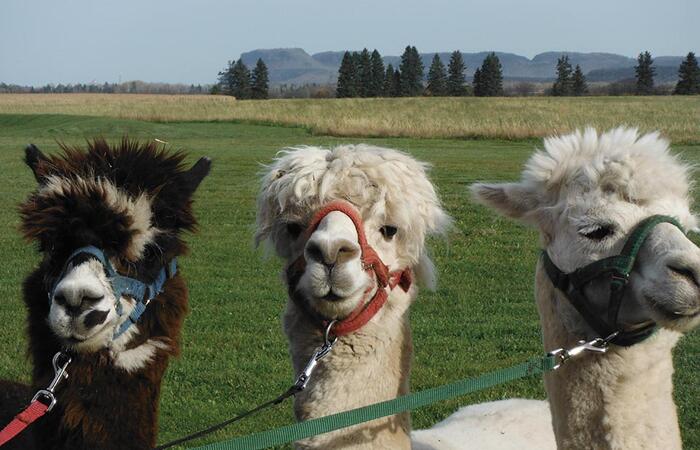The Old Farmers’ Almanac tells us it’s going to be one long cold winter, which comes as no surprise considering how unusually cool and wet our summer was. If summer was slightly disappointing, then winter may as well lay it on real thick too. After all, we’re northerners, and in true Thunder Bay spirit we say, “Come on winter, bring it on! We can take it! We’ll fill the wood shed with birch, prepare plenty of apple cider and oil up the ol’ snowshoe harnesses! There is nothing we can’t handle!”
Or is there? In the past few winters, my body has been protesting a little bit more than usual when I head out to do the morning chores, or trek into the back forty donning my snowshoes. Although my skin has toughened and can handle any northern wind, my feet are becoming a little, shall I say, cold, miserable and embarrassingly wimpish when it comes to anything more than fifteen below.
So in preparation for the next six or seven months I stopped by Alpaca Valley Farm to pick up some of their lovely alpaca wool socks. I heard from a few friends that if there was anything that would keep my unusually cold feet warm this winter it would be these.
I walked into their store with great anticipation.
I ran my fingers over a lovely pair of alpaca socks and immediately felt those cold winter days of frigid feet disappear. It was heavenly.
Co-owner Connie Wilson then asked me, “Would you like to meet Escobar, Bandito, Monsanto, and Presley?”
My first thoughts were of three Spanish men singing back up for the King of Rock and Roll, but then I realized, no, I’m at an alpaca farm. These must be the names of their fine woolly friends, the four alpacas who were grazing outside the store.
“Of course,” I said. “I’d love to.” After all, I am a horse lover, an animal lover and anything that is warm and fuzzy is fair game for a loving stroke or two behind the ears.
We went outside and Connie and her husband, Darryl, put the halters on their “pets” and brought them up to the gate.
He pointed out the larger of the alpacas, the one with the golden-brown hair. “This is Escobar. He’s the alpha male here. Everyone listens to him. He gets the grain first, has first pick of the best grass, and all the guys know to stay out of his way.” He got the first rub behind the ears.
I then met Bandito, a chocolate-coloured alpaca sporting a very distinctive mustache who certainly suited his name. Then there was Monsanto, a shy white guy who was more interested in the lush green grass than a woman who offered a measly rub behind the ears, and Presley, another white alpaca whose long locks on his head closely resembled those of his name-sake.
Connie and Darryl have learned a lot about alpacas since bringing them to their farm over ten years ago. Everything from feeding to nail trimming to shearing.
“They’re really easy to care for,” Connie said. “They’re the perfect pet. Low maintenance and they have a purpose.”
I learned that being a member of the Camelidae family, (think camels and llamas) alpacas drink little water and one acre of grassland can support up to ten of these creatures. Their nails need to be trimmed up to four times a year and because of their thick fur coats they’re quite hardy when it comes to our long cold winters. And they all tend to use the same spot for their bathroom facilities, which makes clean up really easy.
And then there’s their fibre. It’s remarkably soft and it can be spun and made into the most luxurious socks, scarves, mittens, slippers, shawls, coats. If it’s an article of clothing that we northerners need to keep us warm, throw in some alpaca fibre and it’s bound to do the trick.
“It’s supposedly eight times warmer than sheep wool,” Connie informed me. And as I plunged my hands into a bag of shorn alpaca fibre I certainly agreed. And then there’s their unusual traits.
“Yes, they do spit,” Connie told me after I asked the same question many of their customers ask. “But only on each other as a sign of dominance.” If you get spit on by an alpaca it’s because you’ve found yourself in the middle of an alpaca duel where one alpaca is establishing its position over another. Checking out the large gobs of chewed grain on the side of the barn wall I made a mental note: Do not get between the alpacas. Do not get between the alpacas.
They also make some unusual sounds. When the alpacas came to the farm they made a distinctive high-pitched humming sound. “At first we thought they were quite happy,” Darryl said. “Checking out their new home and enjoying the lovely new grass. But then we found out that the sound means they’re concerned. We don’t hear that high-pitched sound very often now. They’re quite happy here, which is why we don’t bring them to other places to show to the public. It’s too stressful on them.”
The alpacas make various humming noises throughout the day. Depending on the circumstances, whether they’re grazing or looking around or checking out something unusual, the pitch of the hum will vary. It’s like being surrounded by an alpaca choir.
There’s also the warning sound. When an alpaca detects any sign of danger, it flares its nostrils and lets out a series of high pitched “shrieks”. It sounds sort of like a donkey’s “hee-haw” but more opera like. The rest of the herd gathers and then looks in the direction of the perceived threat.
It didn’t take me long to fall in love with these gentle beasts. And as a horse-owner I could totally relate to Connie and Darryl’s enjoyment of caring for these animals: feeding them, keeping a clean barn, and enjoying their unconditional love. It’s quite therapeutic, actually.
So as I left their store, carrying my new socks and insoles (for extra cold days) I had one interesting thought. How am I going to convince my husband that an alpaca or two would do nicely on our farm? Guess I’m going to have to take him out sock shopping soon.
For more information about Alpaca Valley Farm visit their facebook page or their website at www.alpacavalleyfarm.com They’re open every Saturday before Christmas from November 18 to December 23 (and by appointment) at their Slate River farm for your shopping needs.





